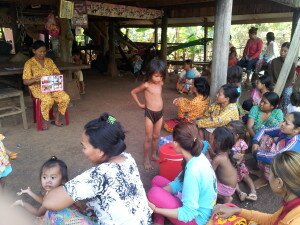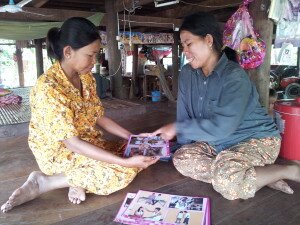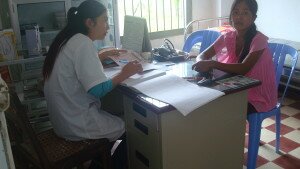By Navy Kieng

© UNICEF Cambodia/2014/Navy Kieng
Mrs. Sophy, the village health volunteer, explains pregnancy to women in her village.
16 February 2015
Kampong Thom, Cambodia, 2 September 2014 – In the remote Cambodian village of Porproak, mothers and pregnant women sit quietly on the ground under a wooden house listening intently at a session organised by village health volunteer, Mrs. Sophy. On a chair in front of the group she holds up pictures and explains what antenatal care services are, and how to prepare for birth. When she asks what the women learned from the session, it is amazing to see her audience enthusiastically engage with each other to provide the answers.
Porproak is a hard-to-reach village in Kampong Thom province, three kilometres from Protaong health centre and 78 kilometres from the provincial town. Most families in this medium-sized village of 516 people are farmers.
In remote villages like Porproak, only about one-third of pregnant women receive antenatal care services and only one-quarter give birth at health facilities. Therefore, to ensure that women receive adequate antenatal care UNICEF – with funding from the Gesellschaft für Internationale Zusammenarbeit (GIZ) GmbH – has supported the training of volunteers in ‘community care for mothers and newborns.’ Mrs. Sophy (50) received her training in 2013.
The training provides village health volunteers with counselling skills as well as knowledge and information on the types of health services women should receive during pregnancy.

© UNICEF Cambodia/2014/Navy Kieng
Mrs. Sophy with a pregnant woman in her village.
They learn how to identify common danger signs during pregnancy so that women seek health services without delay. With this knowledge, Mrs. Sophy conducts home visits as soon as she knows that a woman in the community is pregnant.
Home visits give the health volunteer an opportunity to involve family members in supporting a woman during her pregnancy.
Mrs. Sohkeng, a 31-year-old villager, said, “Before, I never had my pregnancies checked and gave birth at home. Now, after Mrs. Sophy explained to me the services and the risks, I have had this pregnancy checked twice.”
Mrs. Sophy said, “I am happy with my work to help the families in my village. I know that it is hard for me but when I see they have gained knowledge about how to take care of pregnancy and prepare for birth, I feel more encouraged to do my volunteer work.

© UNICEF Cambodia/2014/Navy Kieng
A pregnant woman discusses her heath with the village health volunteer at Protaong Health Centre.
“I always take my free time to see families at home, especially the poor ones; to explain to them what health services a woman should receive during pregnancy and how to prepare for birth,” she said.
“I also help poor families to access commune budgets or health equity funds. I see changes in my village in the last one or two years after women and their families have more knowledge about pregnancy and birth,” said Mrs. Sophy.
“I also noticed that the health centre has more equipment. More women from my village go to the health centre for pregnancy checks and give birth there,” she said.
Although there are still many pregnant women who do not receive antenatal care services and continue to give birth at home, the Protoang Health Centre report shows an increasing trend in service delivery coverage after village health volunteers were trained in ‘community care for mothers and newborns’ and the health centre received additional equipment thanks to the German Government and GIZ.

